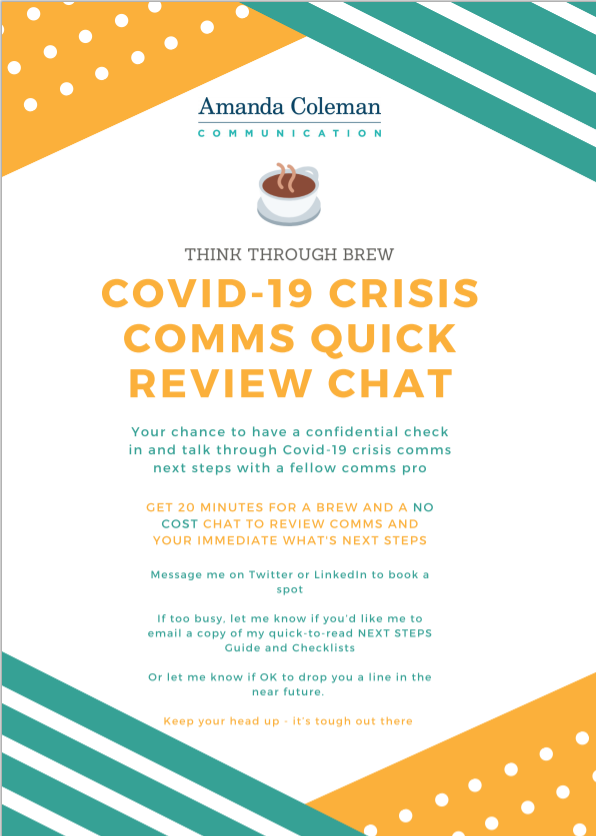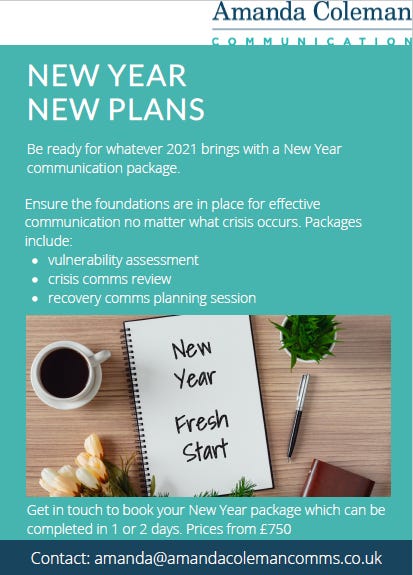“Here we are in 2021 and we are still living through the Covid-19 pandemic. Just because the calendar has changed will not mean a significant change to the position we are in.”
I wrote those words as I started to develop this newsletter just before the latest lockdown hit the UK. Just before Christmas the UK found there was a concerning varient to the virus which is considerably more infectious. There is now a national lockdown and a return to the message ‘stay home, protect the NHS, save lives’.
It means once again there needs to be a huge communication effort and this comes after a Christmas and New Year of announcements leading up to the lockdown. Communicators are exhausted, to be fair I think we are all exhausted, but when you are in the eye of the communication storm switching off is not easy.
There are three things I would share about wellbeing, and they come from personal experience of the impact that crises have.
Acknowledge how you feel and talk about it. It is ok to not be ok so don’t beat yourself up when you have a tough day. This is an emotional rollercoaster and there will be ups and downs. Don’t keep things inside and use your support network to share, offload and then find a way to move forward
Switch off when you can. Being a communicator means you are going to have to know what is going on but don’t let the news become an obsession. Turn the news off when you can and step away from social media.
Find something you enjoy that you can get absorbed in. I find drawing and painting switch off my brain. I am just in the moment focusing intently on what I am doing. Whatever activity you enjoy make time for it as the mindful moments will be a real boost.
Last year I started the #thinkthroughbrew to give people somewhere to go when they wanted to share, check in or offload. Just 20 minutes of chat over a brew with another communicator can help. Just get in touch if you want to join me for a #thinkthroughbrew
Covid Vaccination Communication
There is a definite challenge ahead for those who need to manage both the roll out and the communication about the Covid-19 vaccination programme. A report by John Hopkins University provides some key points for communicators. It was shared by crisis communication expert Shawna Bruce who has outlined some key communication actions including ‘rejecting any political trappings’. Find out more here.
Culture and crisis
There was an interesting article published online by Forbes which looked at the importance of culture in determining the approach to dealing with and managing a crisis. According to Maury Peiperl who looked at 35 countries it may even affect whether you consider something to be a crisis. Read the article here.
More pandemics will happen
The chief of the World Health Organisation has said pandemics and epidemics are a fact of life. He was speaking in a video to mark the first International Day of Epidemic Preparedness. The key element was seen as preparedness and importantly to learn the lessons no matter where you work. If you are interested watch the video here.
In Brief
The Lincoln Project senior advisor and Republican consultant Susan Del Percio has outlined the leadership principles important during the Covid-19 crisis. One key element is good communication. Read more here.
Forbes outlined the importance of changing direction if required during a crisis citing the UK Government. More here.
In another article Forbes looks at the pandemic and how it may require changes to the way crisis management is delivered. Read the details here.
The World Health Organisation have given details of global health issues that should be tracked in 2021. Read details here.
Scottish newspaper The Scotsman has asked experts why Nicola Sturgeon has emerged stronger from dealing with the Covid-19 pandemic than Boris Johnson south of the border. One of the elements highlighted is her communication and the appearance that she had a better crisis communication strategy. Read more here.



